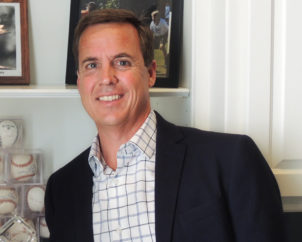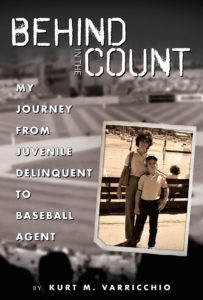Kurt Varricchio, Florida State ’93, endured a tough childhood after losing his father while a toddler and experiencing years of abuse. As an adolescent, he began committing petty thefts and skipping school. Yet, he always maintained an inner desire to succeed. His memoir, “Behind in the Count: My Journey from Juvenile Delinquent to Baseball Agent,” (www.behindinthecount.com) chronicles how he overcame his difficult childhood, completed a law degree and became a successful sports agent.
Jake Bredstrand, Washington State ’11, spoke with Varricchio about the book, as well as his life, career and SigEp experience. An edited transcript follows.
Jake Bredstrand: In your recently released book, you discuss your difficult childhood, as well as the professional and personal successes in your life. Why did you feel it was important to share the hard times you experienced in those early years with readers?
Kurt Varricchio: My objective in writing the book is to make an impact on our youth and on those who serve our youth, especially those who are facing the same challenges I faced growing up. Many of the issues I experienced are similar to the issues kids still face today, so it was important for me to open up about my experiences and to let them know that I, too, was in their shoes. I feel this resonates more with the youth I am trying to help.
JB: You could have let your early experiences derail you. Who or what motivated you to succeed in school and in life?
KV: I always tell people — including my own two sons — that you can either use your setbacks as an excuse to fail or as motivation to succeed. While we cannot control everything that happens to us, we can control how we respond to what happens to us. I was tired of being told by others that I was going to be dead or incarcerated by the time I was 21, and I wanted to prove them wrong.
JB: How did you end up joining SigEp?
KV: While I participated in rush the first week of my freshman year, I wasn’t quite ready to jump into the fraternity scene because I wanted to get acclimated to college. Accordingly, I waited until my second semester to go through the rush process again. Prior to that, I met a couple of SigEps during my first semester at Florida State, and I thought their values meshed with mine.
JB: What do you remember most about your time in the chapter? Were there any experiences or lessons learned that continued to influence you after college?
KV: The thing I remember most about my time at Florida Epsilon (aside, of course, from the incredible social scene and camaraderie) was the amount of involvement by SigEps in campus activities. During my years at Florida State, SigEps permeated the campus: student body president, IFC president and vice presidents, homecoming court, homecoming chairman, student government, theater/music/radio/television, student alumni association leaders, orientation leaders, etc. The SigEps at Florida State were go-getters. These balanced men were recognized as Fraternity of the Year in 1991-92 and 1992-93 — a prideful accomplishment I share with all of my Florida Epsilon brothers.
JB: Do you still keep up with any of your chapter brothers?
KV: Definitely. A few of them actually helped in the early stages of the book. (Thanks, Brett Murphy [’92] and Scott Edinger [’92].) I have also called upon some of my Fraternity brothers to help my clients with legal matters, tax preparation, investment opportunities and real estate transactions. When I travel, I always try to connect with my Florida Epsilon brothers for lunch or dinner to catch up and reminisce.
JB: While earning your master’s degree at UT Austin, you served as the resident scholar for Texas Alpha. How was your experience as a SigEp volunteer?
KV: That was one of the most challenging, yet rewarding, jobs of my early career. Texas Alpha had just undergone a membership review. When I arrived at UT, we had about 14 active members (down from 120+). These 14 members — backed by incredible alumni support — were unbelievably committed to the process of bringing SigEp back to its rightful prominence at the University of Texas. Over the next two years, we worked tirelessly to recruit the right type of student, and our efforts paid off as SigEp was recognized as UT’s Fraternity of the Year for the 1994-95 school year.
Upon completing my master’s degree, the chapter’s membership had grown to about 95 brothers, and it was a force once again at the University of Texas. I’m still proud of the commitment those few remaining SigEps made in the fall of ’93 and value their resiliency.
JB: Let’s shift gears a bit. Can you explain what a sports agent does and how you cultivate the agent-athlete relationship?
KV: My job as an agent is to provide guidance, insight, direction and support to my clients. Whether we are marshaling information and managing expectations for our draft-eligible advisees, negotiating free agent deals, preparing for and presenting an arbitration case, or working on marketing and endorsement opportunities for our clients, it is key for them to understand all options and the ramifications of choosing one over the others. We educate our clients on the business side of baseball while we maximize their earning potential during their playing career. We recruit players whose values align with our firm’s core values, and we work on building trust and respect with each client.
JB: Please talk a little more about your career journey. How did you get started, and what path did you follow?
 KV: My first job in professional sports was with the Kansas City Chiefs in their corporate marketing department for the 1995 season. In 1996, I was hired by the San Diego Padres and spent the next seven seasons working with the club in various capacities. While working with the Padres, I pursued my law degree at the University of San Diego and graduated with my J.D. in 2002. At that point, I decided to “retire” from the Padres to focus on studying for the California bar exam. Fortunately, I passed and promptly launched my own law firm.
KV: My first job in professional sports was with the Kansas City Chiefs in their corporate marketing department for the 1995 season. In 1996, I was hired by the San Diego Padres and spent the next seven seasons working with the club in various capacities. While working with the Padres, I pursued my law degree at the University of San Diego and graduated with my J.D. in 2002. At that point, I decided to “retire” from the Padres to focus on studying for the California bar exam. Fortunately, I passed and promptly launched my own law firm.
At this same time, I knew I wanted to continue my work in professional sports, so I started recruiting young minor league players and kept grinding through the peaks and valleys. I’ve had a few partnerships along the way, but ultimately decided to branch off on my own for a myriad of reasons. Today, my firm represents players at the major league level, in Asia and everywhere in between.
JB: How do you continue to grow and develop as a sports agent?
KV: In this business, you are only as good as your clients. If you recruit the right type of players (skill set, character, etc.), then you are in a good position. We scout and recruit young, draft-eligible talent, as well as current professional players at all levels. In addition to our major league clients, we must have the next group of players available at Triple-A, Double-A, A+, low-A and rookie ball. We also must recruit draft-eligible players to fill the pipeline. We believe that every single player we recruit has a legitimate chance to make it to the big leagues or to play in Asia.
Of course, not every player we represent will make it to the major leagues or Asia for one reason or another, but identifying the players who have a realistic chance to get there is of paramount importance. Using this approach, more than 60 percent of our clients who have played three or more seasons of professional baseball have either played in the major leagues or in Asia.
JB: Are there any new challenges you’re looking forward to?
KV: I am always looking for new challenges because new challenges present new opportunities. While my team and I are working on some new challenges in the sports industry, I have embarked on a personal challenge to make an impact on as many people as possible, particularly those who are in a similar position as I once was. In addition to the book, I am also speaking with various groups around the country to help spread my message of perseverance, resiliency and commitment. I’m always searching for ways to give back, and I’m hopeful this book and my speaking engagements will resonate with people.
JB: What career or life advice would you give to a younger version of yourself?
KV: First, understand that there will be peaks and valleys in your life (personal, professional, emotional, etc.) and be ready to deal with them because you have your eyes set on long-term goals. Second, trust your gut. If your gut is telling you something, it’s most likely because it is relying on your past experiences, your values and your rationale. Third, embrace failure as an opportunity to learn — don’t just accept it.
In baseball, we know the greatest hitters in history have failed seven out of 10 times. Just as those players found valuable lessons in each of those seven failures, so, too, should you. Understand why you failed so you can avoid making the same mistake and use those experiences to successfully fuel your next endeavors.
JB: What do you do to remain healthy, balanced and energized? What does that look like at this stage of your career?
KV: Every day, I focus on further developing a sound mind, a sound body and a sound spirit. I try to exercise at least four to five times per week, and I watch what I eat. If I’m busy traveling and don’t have time to exercise, I tend to go overboard on the healthier eating to offset my lack of exercise, and I try to do little things to give me some type of physical boost (e.g., taking the stairs in the airport/hotel). To me, exercise is one of the most important habits you can have as you age because it helps facilitate the other two components — sound mind and sound spirit.
As a sports agent and attorney, it is critical for me to stay in tune with the most recent developments in the industry (signings, labor agreements, arbitration rulings, etc.) and to maintain appropriate relationships with industry peers (front office executives, Major League Baseball Players Association union employees/reps, media, etc.).
Being on top of these developments (sound mind) and maintaining my relationships (sound spirit) is critical to my success and, ultimately, my clients’ well-being.









Leave a Reply